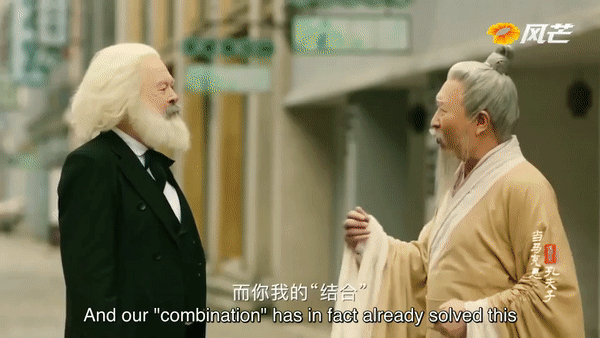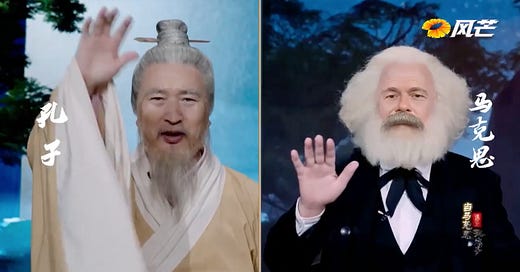
If Karl Marx and the ancient sage Confucius were to sit down in twenty-first-century China and shoot the breeze with pink-cheeked students and history professors — hey, what would that be like? Would Confucius be intriuged by the eternal science of Marxism? Would Marx vibe with socialism with Chinese characteristics?
Hunan Television 湖南卫视 has generously answered these questions for us in a new five-episode series, When Confucius Met Marx 当马克思遇见孔夫子, which pushes the boundaries of cheesiness, banality, and — to borrow a phrase the cultural bureaucracy likes to pitch at opponents — historical nihilism.
It’s not that Hunan Television can’t make good television. In fact, they’re arguably the best in the Chinese television business: they are known for slick variety and reality programming — like Where Are We Going, Dad? 爸爸去哪儿 (a Korean concept that features celebrity fathers going on adventures with their kids), Sisters Who Make Waves 乘风破浪的姐姐 (a recent hit that appealed to aging millennials by documenting the travails of producers building a supergroup of turn-of-the-century pop stars), and even lush romantic fantasies like Love of Thousand Years 三千鸦杀.

Hunan Television has managed to adapt to the times better than most state-owned broadcasters, and their Mango TV online platform competes with paid streaming services like iQIYI 爱奇艺.
Success and a huge audience, however, have come with some downsides. The broadcaster has come in for criticism, with Party officials charging them with glorifying celebrities and indulging in sensationalism. All state-owned broadcasters have certain obligations — but Hunan Television needs to pay special attention to fulfilling the call to make some amount of programming that fits with directives from the cultural bureaucracy to provide “positive energy” 正能量, “tell China’s story well” 讲好中国的故事, and update the public on General Secretary Xi Jinping’s latest theoretical contributions.
And so, between the blockbuster romances and variety shows, we get programming like When Confucius Met Marx, an insipid combination of fish-out-of-water time travel comedy with Marx and Confucius, computer graphics resurrections of historical figures as talking heads, and lectures from some of the country’s most anti-charismatic academics on Xi Jinping’s Two Combines 两个结合 — that is, combining the principles of Marxism with the country’s present material conditions, and combining the principles of Marxism with “China’s excellent traditional culture.”
It’s clear that the usual Hunan Television recipe of big budgets and top talent is not being expended here.

The first episode begins with the titular encounter, hosted at the Yuelu Academy 岳麓书院, a Confucian academy in Hunan that dates back to the early tenth century. Initial awkwardness over the handshake is quickly forgotten as Marx and Confucius discuss the historical debate that pitted the philosophies of the two men against each other.
Marx notes that he has recently read an essay by Guo Moruo 郭沫若 called “Marx Enters the Confucian Temple” 马克思进文庙, which details a fictional meeting in Shanghai between the two philosophers. Confucius seems familiar with the essay, too. There is no explanation of the timeline: the essay was published in 1926, millennia after the death of Confucius and over forty years after the death of Marx. Before their meeting in the twenty-first century in China, where were Marx and Confucius?
Even if the execution is questionable, the concept is interesting. It addresses an issue that has loomed large in Chinese intellectual life since the demise of the imperial system at the beginning of the last century: can traditional thought be modified and preserved in a way that makes it compatible with progressive politics? Or must it be discarded completely?
To the intellectuals of the New Culture Movement, Confucianism became a moral system, a metaphysics, a philosophy of governance, a religion, a literature — as well as a shorthand for a regressive, patriarchal worldview. While some thinkers hoped to reconcile positive elements of Confucianism with progressive politics (whether socialist or republican), the tide was against it.

Confucianism was consistently criticized after the Chinese Communist Revolution in 1949, leading under the excess of the revolutionary years to wild scenes, like thousands of Red Guards teaming up to dynamite the tombs of his descendants. The Gang of Four’s final campaign, as they lost control over the Party and state, was a revival of legalism 法家 as part of a struggle against Confucianism.
By the time liberals in the 1980s took up the cause — arguing along the same lines as previous rebels that Confucianism represented a dead weight on progress — academic interest in indigenous thought was being renewed, but there were no signs of official revival.
The past two decades have seen a radical change in the fortunes of the Confucians. A New Confucianism, developed in the larger Sinosphere while the homeland was undergoing its revolutionary upheaval, was imported back into China. Confucian ideas about statecraft were revived in the writing of traditionalist authoritarians in Chinese academia and spread to Party theoreticians. As Marxism was transformed beyond recognition, the idea of a Confucian software to operate the hardware of the state became popular again. Compared to previous generations of post–Deng Xiaoping leaders, Xi Jinping seems more comfortable quoting the Confucian classics than Lenin and Mao did. Chinese tradition, much more so than Marxism, has been at the center of his political program.

But as Confucius enters the CGI lecture hall, greeting his academic hosts and a crowd made of students, none of that unpleasantness is raised. Nobody asks what Confucius made of the Red Guards dynamiting the tombs of his descendants. Nor do they ask him about the Gang of Four’s vicious denunciation.
The hosts instead ask for Confucius to comment on General Secretary Xi Jinping’s “Second Combine” — the combination of Marxism and “excellent traditional Chinese culture” — and he defers to Marx, who demurs, saying that, when the greatest sage in Chinese history is present, he’s scarcely qualified to speak. The two philosophers finally bat back and forth some inane remarks, but not much of substance is said.
This banal exchange sets the tone for the program. In an early segment, there is a bit of friction as Marx makes a few strident remarks about his philosophy’s basis in class struggle and his goal of becoming the “gravedigger of the propertied class.” He accuses Confucian philosophy of being intended for stability, based on a patriarchal system of clan and family relations. But none of this is debated, as both men agree that their utopian visions of communism and “great unity under heaven” are essentially compatible.

The philosophies of both Marxism and Confucianism expressed by their time-traveling originators are peculiarly suited to modern China: Marx’s historical materialist analysis and emphasis on class struggle is generally replaced with platitudes about caring for one’s fellow man; and Confucius ignores statecraft to repeat the mildest lines from the Classic of History 书经 that deal with caring for widows and loving one’s neighbors.
The program stretches across five half-hour episodes, but there aren’t many surprises after the first episode. Marx and Confucius marvel at high-speed rail. They express support for various hazy concepts, like the “Four Confidences” 四个自信 — confidence in the path, theory, system, and culture of socialism with Chinese characteristics — and the sinicization of Marxism. They receive CGI guests, including Mao Zedong, that mouth the same banalities.

If the program is a bit silly and underwhelming, it is nonetheless useful for the observer of Chinese politics: it lays out in the simplest terms the ideology of the Party-state. That ideology, even as it borrows the language of Marxism, is not strictly Marxist; and even as it borrows from traditional philosophy, it has remade that philosophy to meet its own ends.
Marx and Confucius, as well as some forms of Marxism and Confucianism, can and must be remade for the purposes of shoring up the Party and state. There is no reason that they should repudiate each other, or challenge the statist philosophy of the Communist Party. In this construction, some version of Confucian tradition moderates the excesses of Marxism, provides an ethical backbone, and gives a spiritual basis for a new authoritarianism.




In a strange way the premise of the show, Kongzi meets Karl Marx, reminded me of an old show on US TV called, I think, Meeting of the Minds by Steve Allen. One show had Empress Cixi discussing matters with other historical figures. Steve Allen was a comedian and the first host of the Tonight Show later hosted by Johnny Carson which is probably before everyone's time and they have no idea what I am writing about. Good piece by Dylan Levi King.
https://www.youtube.com/watch?v=tcO7HSCXR9M